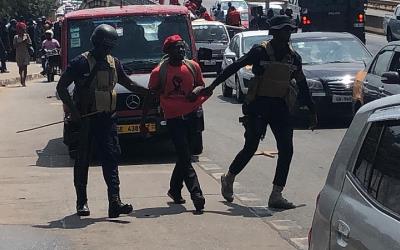16th OCTOBER, 2019
OCCUPYGHANA® PRESS STATEMENT
OCCUPYGHANA® DEMANDS ASSETS AND LIABILITIES DECLARATION BY OVER 40,000 AFFECTED PUBLIC OFFICERS
NON-COMPLIANCE
Article 286 of the Constitution demands the declaration of assets and liabilities by the occupants of certain public offices under three circumstances: (1) upon appointment, (2) every four years, and (3) at the end of the appointment. This provision has become notorious for the breach of it rather than compliance with it.
Often, the discourse has focused on the political offices that article 286(5) specifically mentions. Scant attention has been paid to the chairpersons, MDs and CEOs, General Managers and Departmental Heads in public corporations and companies “in which the State has a controlling interest,” who are also covered. Possibly no attention is paid to the category the Constitution specified as “such officers in the public service and any other public institution as Parliament may prescribe.”
In the Public Office Holders (Declaration of Assets and Disqualification) Act, 1998 (Act 550), Parliament prescribed several additional, covered officers including officers “in any other public office or public institution other than the Armed Forces, the salary attached to which is equivalent to or above the salary of a Director in the Civil Service.”
From preliminary and raw data to which we are privy, the number of public officers who fall within this ‘salary-based requirement’ but who do not comply with the mandatory declaration of assets and liabilities exceeds 40,000.
In the Ministry of Education alone, over 5,000 officers are covered. Others include the Ministries of Finance and Health, each of which has over 3,000 officers covered. Each of the Ministry of Interior, Ghana Health Service and Controller and Accountant General’s Department has over 1000 officers covered. The Audit Service has well over 600 officers affected.
When we apply the ‘salary-based requirement’ to officers of the various other Ministries, Departments, Agencies, Authorities, Commissions, Councils, Boards, Services, Institutes, Organisations, Secretariats, Colleges, Programs, Diplomatic Missions, and the Metropolitan, Municipal and District Assemblies, then our 40,000 estimate appears extremely conservative. The actual figure could exceed 10% of all public servants.
The effect is that all of these public officers are in breach of article 286 of the Constitution and should be facing sanctions under article 287.
ONLINE DECLARATIONS
The sheer volume of declarations required brings into sharp focus the capacity of the Auditor-General to receive the declarations and then verify them to ensure that the correct declarations are made. The statutory requirement for obtaining, completing and submitting hard copy forms is clearly obsolete and impractical, and a fetter to both compliance and the Auditor-General’s audit and verification responsibilities.
We therefore call upon the Government to, as a matter of extreme urgency, procure necessary, appropriate and robust software that will make it easy both for affected officers to comply by simply filling the forms online and for the Auditor-General to audit and verify the declarations made. We also call for the immediate amendment of Act 550 to provide statutory support for the online declaration regime, if deemed necessary.
CONCLUDING COMMENTS
In our press release on Assets and Liabilities Declaration issued on January 28, 2018, we stated that the Auditor-General’s post-declaration audit and verification function, which to the best of our knowledge have never happened, are critical to ascertain whether the assets and liabilities are declared in accordance with the law, upon the assumption the public officer assuming office. The audit and verification would investigate whether the assets declared actually exist, so as to prevent ‘assumptive’ declarations, where the person declares non-existing assets now, based on the assumption that through corruption those assets may be acquired later. The audit and verification would also determine whether the declarations were submitted within the time provided by the Constitution, and whether any new assets were acquired or liabilities discharged while in office, so that an inquiry may be conducted into whether those assets or the means to settle the declared liabilities were acquired genuinely.
We repeat that the only way to give voice and flesh to article 286 is to equip the Auditor-General to verify and audit declarations that are submitted, or at least a sample of them.
We once again call on the Auditor-General to outline a verification and audit procedure that reflects the true and proper interpretation of the Constitution, particularly article 286, in line with the above, and implement it forthwith.
Yours in the service of God and Country
OccupyGhana®




Recent Comment